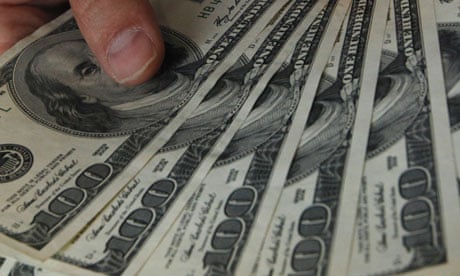Like global billion-dollar corporations, every one of us manages a supply chain. You might be supplied groceries by Whole Foods, clothing by Gap, shoes by Nike, gas by Shell and electronics by Apple. Or not - most of us have dozens of retailers or brands from which to choose.
But when it comes to credit cards, the majority of Americans turn to a small number of big banks: JP Morgan Chase, Bank of America, Citi, Wells Fargo, Capital One and US Bancorp.
Kat Taylor, the founder and CEO of One PacificCoast Bank, has set out to change that. One PacificCoast Bank ("Welcome to Beneficial Banking"), based in Oakland, CA, offers a socially and environmentally preferable alternative: a bank with a mission to serve low-income communities and the environment.
And if the idea of switching checking your checking accounts (with their very sticky electronic bill-paying services) or your deposits to a regional bank (without its own nationwide network of ATMs) seems inconvenient, Taylor has a simpler proposition for customers who want to clean up their financial supply chain, just switch your credit card.
"We're asking people to fund all of their purchasing activity from a bank with which they are aligned," Taylor said.
But can a little-known bank with just $320m (£199m), in assets take on Wall Street? Certainly not on its own, but Taylor is enlisting some formidable like-minded allies, notably the Sierra Club, in her crusade. As America's oldest and largest environmental group, with 2.1 million members, the Sierra Club has agreed to issue a credit card with One PacificCoast Bank. The club's share of the proceeds will help support environmental campaigns, often targeted against polluters who are financed by Wall Street. Bank of America, for example, is among the underwriters of a share offering from Coal India, the target of a Sierra Club campaign.
"If you and millions of others decide to switch, and to use the new card, you have provided Sierra Club with revenues and deprived Bank of America of revenues – until they change their lending practices," Taylor said.
Taylor, who is in her late 50s, is no ordinary small-town banker. Her grandfather was one of the founders of Crocker National Bank, which was absorbed much later by Wells Fargo.
She was educated at Harvard, where she sits on the Board of Overseers, and later earned an MBA and a law degree from Stanford. As a grad student there, she met her husband, Tom Steyer, who went on to earn a fortune as the founder of Farallon Capital. (Steyer is now deploying his money to fight climate change, working with former Treasury Secretary Hank Paulson and New York mayor Michael Bloomberg, among others.)
The two met, the story goes, while running on the Stanford track, and went on to run a marathon together in less than three hours, an impressive time. The point is, they are a formidable couple. "We had six governors over to dinner last week," Taylor remarked, casually, when our interview veered into a conversation about how to rebuild a bipartisan movement to fight climate change.
When I visited Taylor at One PacificCoast, she told me that the bank was chartered in 2007 as a federal thrift. She and Steyer provided the capital, but the bank is owned by a foundation and certfied as a B Corp., which means it aims to benefit society as well as its owners. "We didn't want to profit from the bank," Taylor said. "If and when the bank ever distributes profits, they can only go to the foundation, to support low-income communities or the environment."
The bank's ownership structure appealed to the Sierra Club, according to Jesse Simons, the organisation's chief of staff. He told me by email: "Because all of the One PacificCoast's economic interest belongs to the bank's foundation, all profits must be reinvested in the communities it serves, and the environment on which we all depend – connecting fiscal management with the stewardship of our air, water, land, and future."
The bank's core business is commercial lending. Typically, the bank makes loans of from $50,000 to $5 million to businesses that support local communities in some fashion - by providing affordable housing, clean energy, food that is healthy or grown in a sustainable way. It also lends to nonprofits. "We're trying to get as much loan capital as we can to the businesses that are going to change the way we live," Taylor said. The bank hopes to attract more deposits from foundations and nonprofits that want to align their own financial-service supply chains with their mission.
Like the Wall Street megabanks, One PacificCoast Bank has grown by making acquisitions, first buying a west coast subsidiary of the failed Chicago community-development bank, Shore Bank, and then by buying 90% of Albina Community Bank, which is based in Portland, Oregon.
The Sierra Club card is just the first to come from One PacificCoastBank, Taylor said. Customers can apply online through the Sierra Club and "they still get mileage or merchandise," she said. "Ultimately, we'd like to pivot away from that because it's not environmentally-aligned." She is hoping to forge branding partnerships with other environmental or social-justice groups.
"There's a world of opportunity there," Taylor said. "This is not just a product. "It's a movement."

Comments (…)
Sign in or create your Guardian account to join the discussion